- Contents
- GeoPoll Climate Change Perception among Africans
- Summary
- Demographic Overview
- Key Findings
- Climate Change Awareness
- Source of Information
- Effects of Climate Change in Africa
- Personal Experience with Climate Change
- Climate change is caused by human activities
- Action taken by communities
- Climate Change Urgency
- Methodology/About this Survey
According to the United Nations, Climate change refers to long-term shifts in temperatures and weather patterns. Such shifts can be natural, due to changes in the sun’s activity or large volcanic eruptions. But since the 1800s, human activities have been the main driver of climate change, primarily due to the burning of fossil fuels like coal, oil and gas.
Climate change is one of the most pressing challenges facing Africa today, with its impacts already being felt across the continent. From rising temperatures and unpredictable rainfall patterns to more frequent and severe droughts and floods, climate change threatens the livelihoods of millions of Africans, particularly those in vulnerable communities. As climate-related disruptions continue to exacerbate food insecurity, water scarcity, and health risks, it becomes crucial to understand how Africans perceive these changes and their readiness to adapt.
GeoPoll Climate Change Perception among Africans
At around the same time, nations were starting negotiations about Climate Change action at COP 29 in Baku; GeoPoll was wrapping up data collection for nationwide surveys in Ghana and Uganda to understand public attitudes, perceptions, and behaviors around climate change.
As Africa takes center stage in the climate change conversation, this survey provides valuable cross-sectional information to help policymakers, and organizations better address these challenges and foster resilience.
Summary
- 93% of the respondents have heard about climate change.
- Social Media (72%) and Television (62%) are the leading source of information for climate change.
- Droughts and water shortage (72%) and Food insecurity due to reduced agricultural yields (58%) are the most significant potential impact of climate change in Africa.
- Extreme heat (40%) and floods (24%) are the most significant potential impacts of climate change on Africa.
- Some people believe that climate change is caused by human activities (78%), while others believe it is a natural process (19%).
- Governments (50%) are the most responsible for addressing climate change in Africa
- Planting trees or participating in environmental initiatives (70%), Reducing waste and recycling (64%) are the top actions to reduce your impact on the environment.
Demographic Overview
The survey collected responses from a diverse group of young Ghanaians and Ugandans. Most respondents were aged 25-34 (50%), with 79% male and 21% female. Most had college degrees (45%).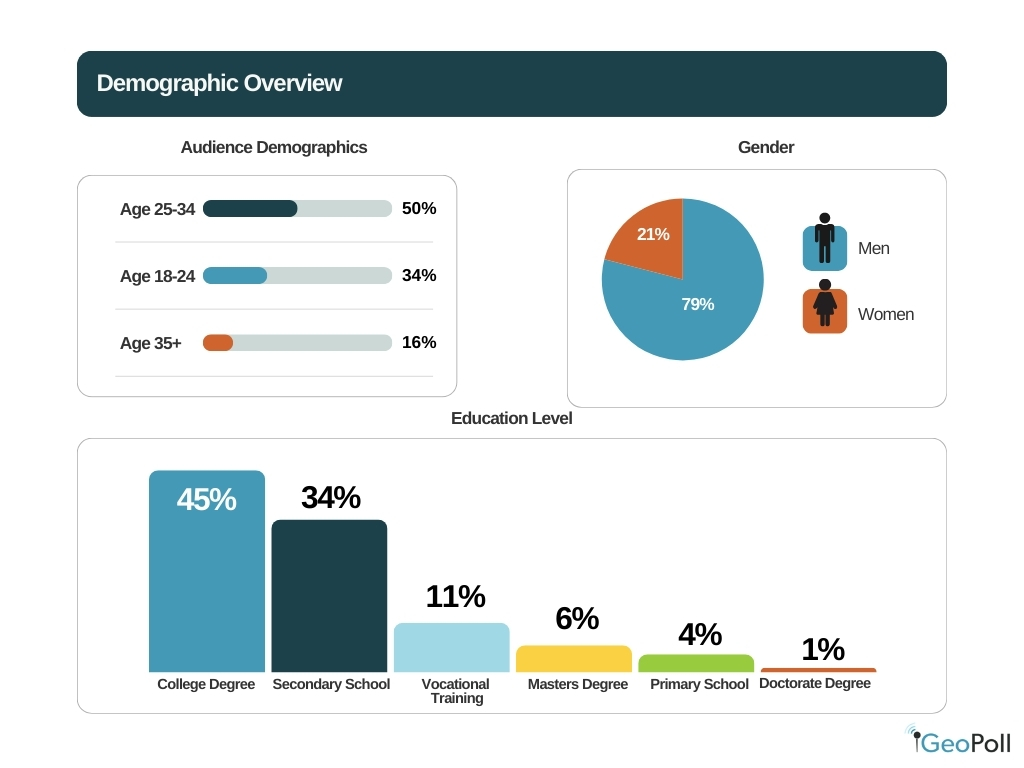
Key Findings
Climate Change Awareness
A majority of the respondents 93% agree to be aware of Climate Change affecting the world. 82% stated that they have good understanding of matters climate change.
Source of Information
The top sources of climate change information highlight the blend of digital and traditional channels shaping public awareness. Leading the way, 72% of people turn to social media, which offers rapid access to news, trends, and activist content. Television follows at 62%, delivering a wide reach with news segments and documentaries, while radio, trusted and accessible, informs 45% of people, especially in areas with limited internet access. Newspapers remain a go-to for 33%, indicating a continued appetite for in-depth coverage. Additionally, government campaigns engage 26% of respondents, and friends and family discussions influence 23%, revealing the role of personal connections in spreading awareness about climate issues.
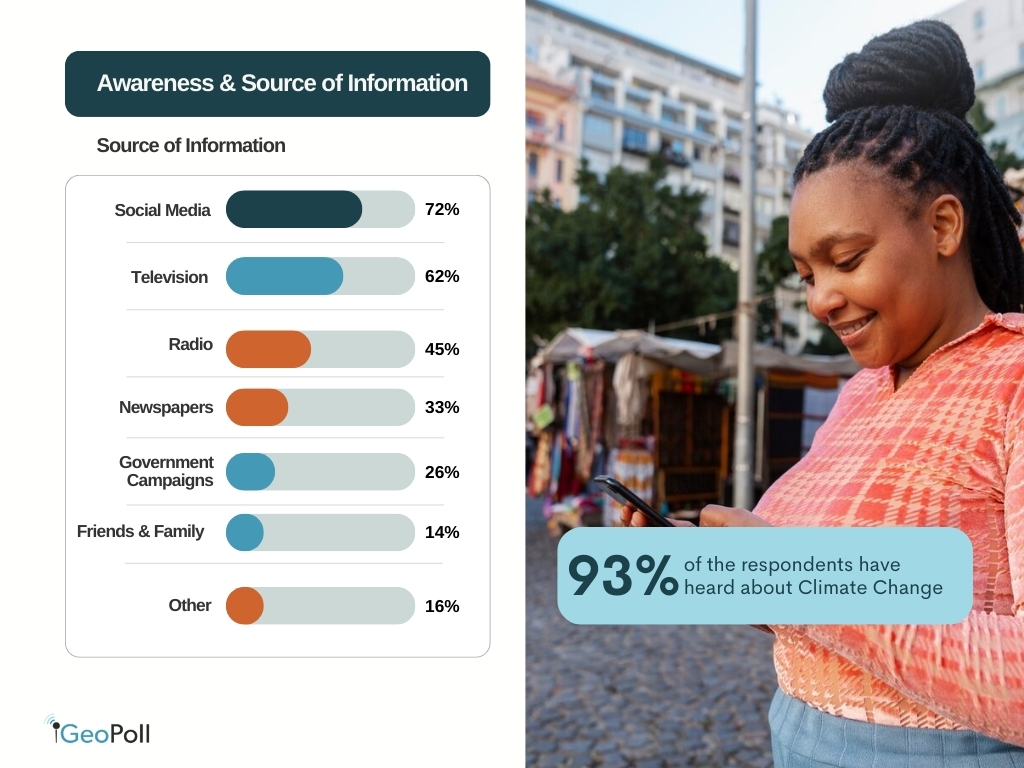
Effects of Climate Change in Africa
When asked if climate change has impacted Africa, a resounding 71% of respondents agree that the effects are significant. Among these, drought and water scarcity stand out as the most visible impact, noted by 72% of respondents. Following closely, 59% highlight food insecurity linked to declining agricultural yields, while 55% point to extreme weather events reshaping communities and landscapes. Economic hardships, cited by 40%, and health issues, noted by 39%, also underscore the sweeping impact on daily life. Other critical concerns include loss of biodiversity and wildlife (34%), rising sea levels and coastal erosion (31%), and even migration from uninhabitable areas (8%), painting a vivid picture of the challenges climate change poses across the continent.
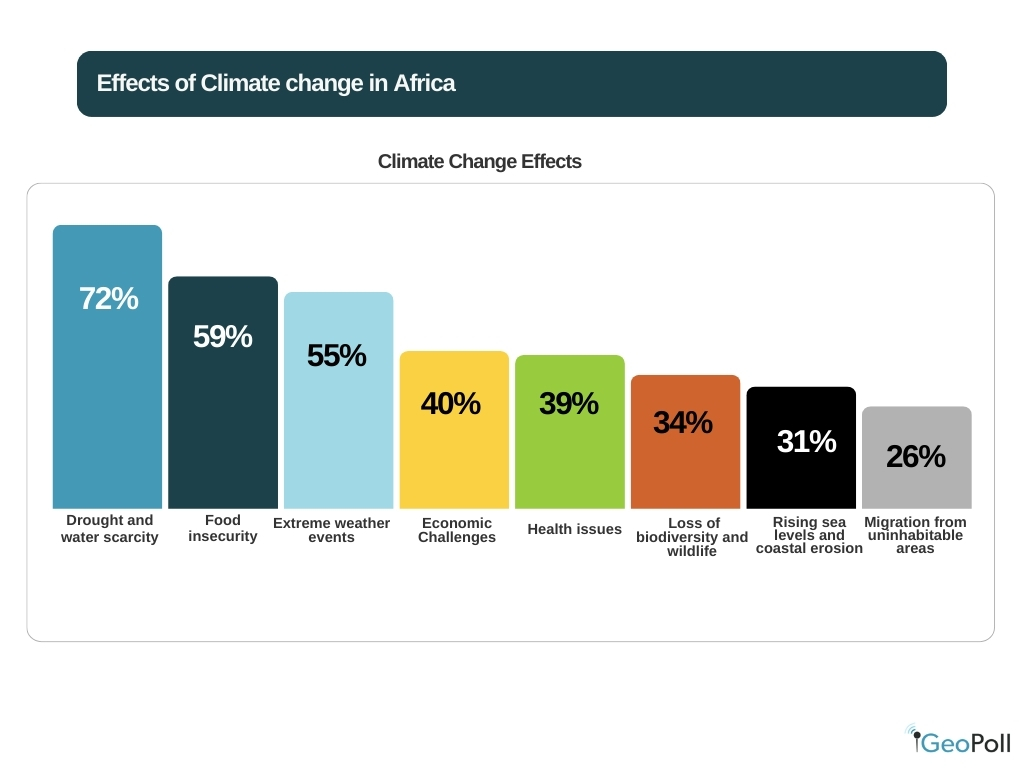
Personal Experience with Climate Change
The study aimed to illustrate the various ways in which individuals’ lives have been impacted by climate change. A significant 66% of respondents indicated that they feel personally affected by this global issue.
Among the specific effects reported, extreme heat emerged as a major concern, with 40% of participants citing it as a significant impact on their daily lives. Additionally, 24% of respondents reported experiencing the adverse effects of flooding, which has disrupted their communities and infrastructure. Food shortages were acknowledged by 20% of those surveyed, highlighting the challenges of maintaining food security in the face of changing climate conditions. Lastly, 12% of respondents expressed concerns about water scarcity, indicating a growing struggle to access this essential resource.
Overall, the findings reveal the tangible and pressing challenges that climate change presents to individuals and communities alike.
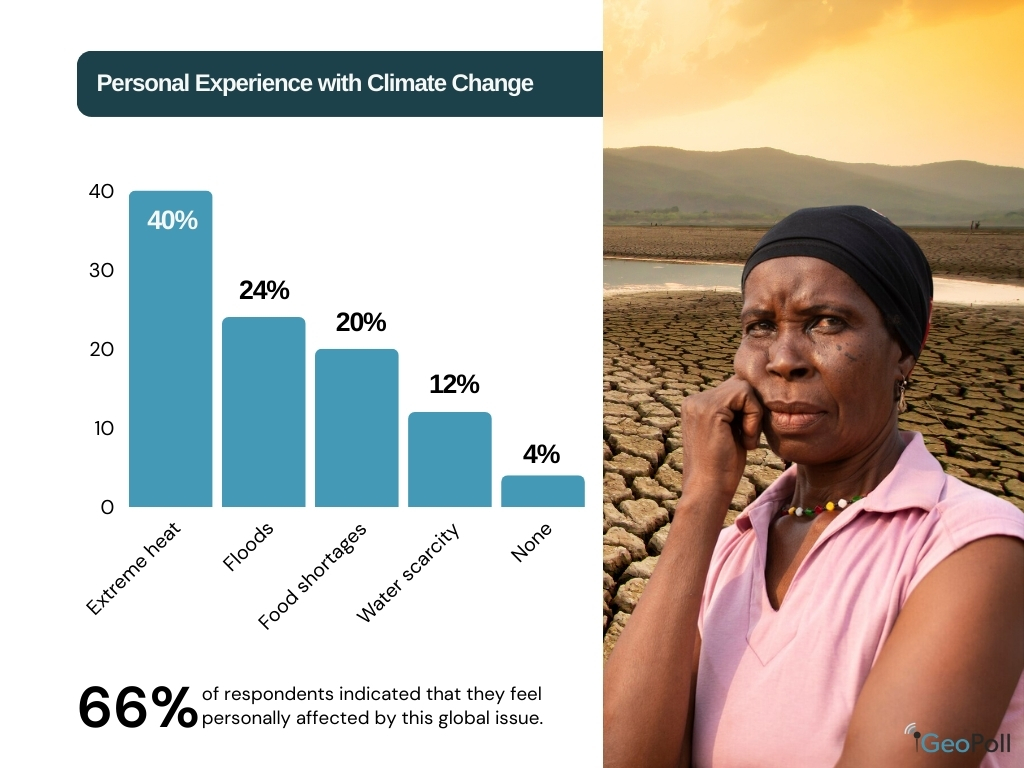
Climate change is caused by human activities
When surveyed, some individuals think that human actions are responsible for climate change, while others argue that it is a natural phenomenon or that it doesn’t exist at all. A significant majority, 78%, believe that human activities are the primary cause of climate change. Conversely, 19% deny that climate change is a result of a natural cycle and attribute it to human actions. Meanwhile, 3% are uncertain and require additional information, and 1% do not accept that climate change is occurring.
Action taken by communities
- Reforestation/Tree Planting – The survey indicates that 53% of respondents are actively engaged in tree planting initiatives and are encouraging community members to participate in these efforts. This collective action is aimed at addressing climate change effectively.
- Education and awareness campaigns – 20% are engaged in educational programs and awareness initiatives related to climate change. As social media emerges as the primary source for information, policymakers, NGOs, and organizations have a greater opportunity to utilize these platforms for disseminating climate change information.
- Water conservation measures – 8% of the respondents are taking water conservation measures in order to curb climate change.
- Renewable energy adaptation (8%) – By leveraging solar, wind, hydropower, and other renewable sources, African nations are diversifying their energy mix, reducing dependence on fossil fuels, and enhancing energy security.
- Waste reduction and recycling (6%) – According to StopWaste, waste prevention and recycling are important practices to reduce greenhouse gas emissions-which are the cause of climate change.
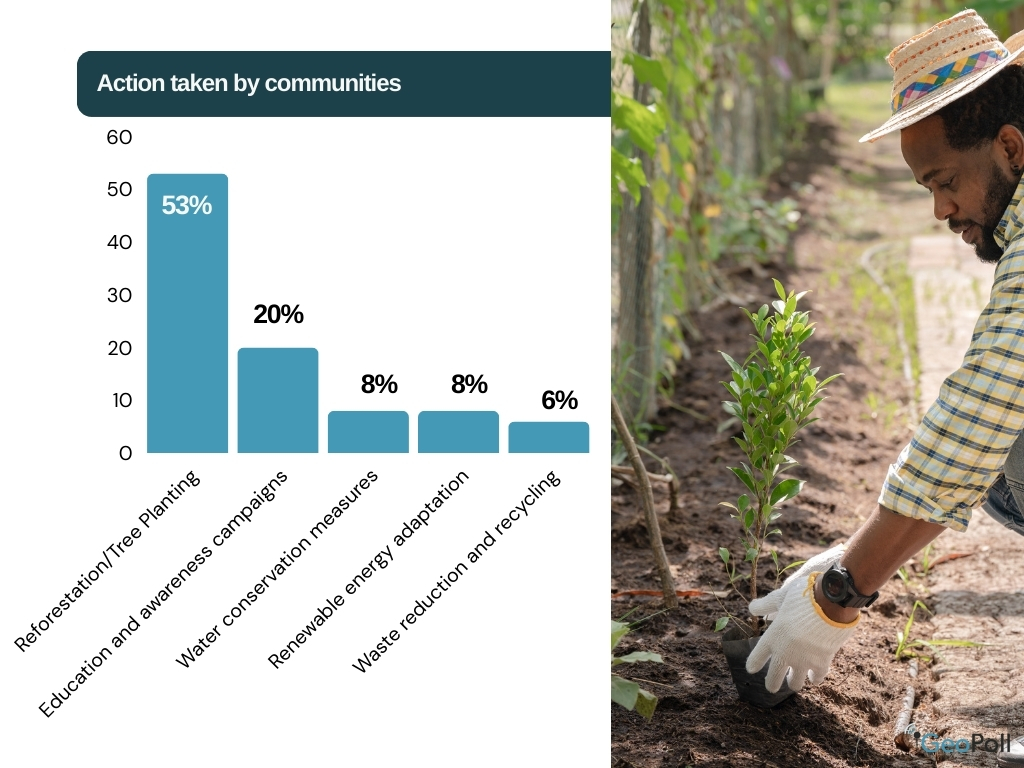
Climate Change Urgency
66% of those surveyed indicate that Climate change needs urgent attention in Africa. For many, the urgency stems from witnessing firsthand the effects of extreme weather patterns, dwindling water resources, and the disruption of livelihoods dependent on agriculture and natural ecosystems.
Furthermore, a notable 89% of participants indicate a desire to expand their knowledge about climate change, demonstrating a broad enthusiasm to grasp the issue and its effects on their lives and communities. This willingness to learn expresses the increasing awareness of climate-related challenges and the understanding that informed people can effect change, whether by adopting sustainable practices or advocating for policy reforms. The inclination to acquire more knowledge also signifies a preparedness to accept new insights, tools, and skills that can assist in both adapting to and addressing climate change.
Methodology/About this Survey
This Exclusive Survey was run via the GeoPoll mobile application between 2nd October and 12th of November 2024 in Ghana and Uganda. The sample size was 630, composed of random app users between 18 and 45. Since the survey was randomly distributed, the results are slightly skewed towards younger respondents.
Please get in touch with us to get more details about exclusive GeoPoll surveys, conduct a scientific study of climate change, or other topics in Africa, Asia, and Latin America.
